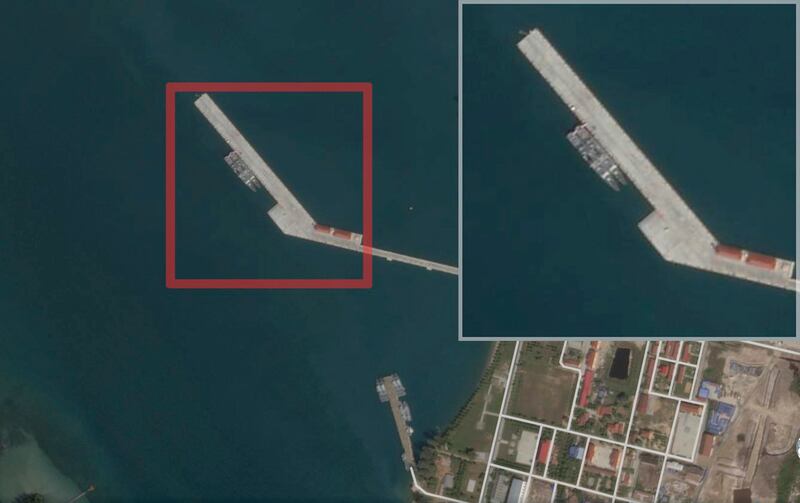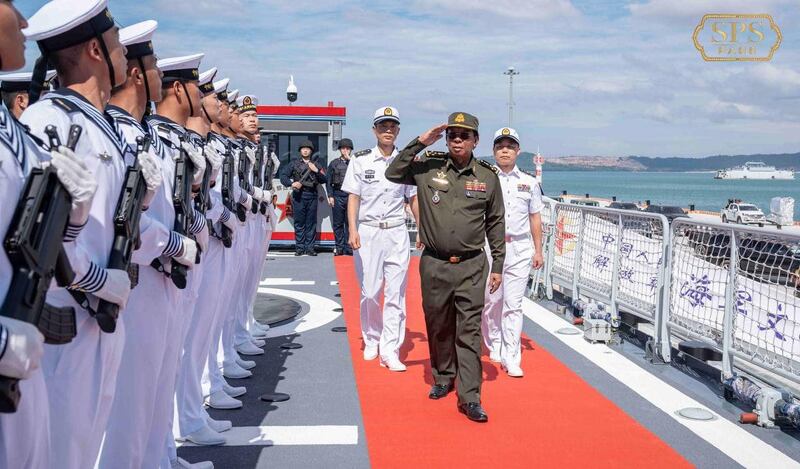Several Chinese warships have arrived at Ream naval base in Cambodia “in preparation for training” the Cambodian Navy, according to a Cambodian official, a rare move accompanied by a Chinese general’s visit to Phnom Penh that is expected to further bolster ties between two countries.
Cambodia's minister of defense Tea Seiha said on his Facebook page last Sunday that he paid a visit to the base, currently under construction with help from Beijing, with his father and predecessor Tea Banh.
Tea Banh was awarded the prestigious title Samdech Pichey Sena – which roughly translates as “greatest, victorious commander” – in 2017 and still retains much influence over the military despite having ceded the post to his son.
The duo visited the People’s Liberation Army (PLA) naval ships “docked at the Ream sea port in preparation for training our Cambodian Navy crew,” reads the post, adding that they “inspected the infrastructure construction which is actively going according to the plan” and that the base’s development “will take the navy's capability to a higher level.”
It is unclear how many PLA ships are in Ream and how long the training would last but in the accompanying photos at least two ships were visible.
Satellite images from the imaging company Planet Labs on Dec. 3 also show two vessels, likely corvettes or frigates, docking at the new pier in the base’s center-west.
This indicates a further, deeper involvement by the PLA Navy in Cambodia.

Until now, there has been no known instance of foreign warships gaining access to the Ream naval base. Russian Navy’s anti-submarine destroyer Admiral Panteleyev while on a visit to Cambodia on Nov. 27 was docked at the Sihanoukville port some 20 kilometers (12 miles) away.
Cambodia’s strategic thinking
Radio Free Asia has reported on the rapid development of the Ream naval base over the past year.
One of the most striking features is the new deep-draft pier that could accommodate aircraft carriers including the PLA’s third carrier Fujian.
Cambodia has repeatedly denied that China is being given exclusive military access to the base, saying that would be in contradiction to the country’s constitution. If operating from the base, this would be China’s first naval staging facility in Southeast Asia and the second foreign base in the world after Djibouti.
Cambodian scholar Chansambath Bong, deputy director of the think tank Asian Vision Institute (AVI), wrote in a new article that “the debate on the re-development of the Ream Naval Base is dominated by Western media and analysts who view Cambodia predominantly through the lens of U.S.-China competition in Southeast Asia and who lack the background in Cambodia’s history and strategic thinking.”
In the article published by the Asia Maritime Transparency Initiative (AMTI) Chansambath Bong argued that "the ongoing re-development of the Ream Naval Base is strategically vital for Cambodia's maritime governance."
“In Cambodia’s view, Ream’s re-development is overdue and within its constitution and rights as a sovereign state,” he added. “Cambodia has leveraged its external ties to address its self-defense and maritime security challenges.”
Community of Common Destiny
The visit of the PLA warships takes place as a Chinese top general pays a visit to Cambodia to promote the "ironclad" friendship between the two countries and two militaries, according to China's state-run Xinhua News Agency.
On Monday Gen. He Weidong, vice chairman of China’s Central Military Commission, met with Cambodia’s leaders including Prime Minister Hun Manet and his father Hun Sen, president of the ruling Cambodian People’s Party.
He also held talks with Defense Minister Tea Seiha to exchange “views on bilateral relations, military cooperation, and international issues of common interest.”
“The two militaries have sustained high-level cooperation in the fields including high-level exchange, mechanism building, joint drills and exercises, and personnel training,” he was quoted as saying.

This year marks the 65th anniversary of China-Cambodia diplomatic relations and the Chinese general “expressed confidence” that Beijing and Cambodia will further strengthen the so-called “Cambodia-China Community of Common Destiny.”
“Community of Common Destiny” is a relatively new concept frequently used by Chinese leader Xi Jinping to describe China’s vision of international relations.
RFA Khmer's Samean Yun contributed to this report. Edited by Taejun Kang and Mike Firn.
